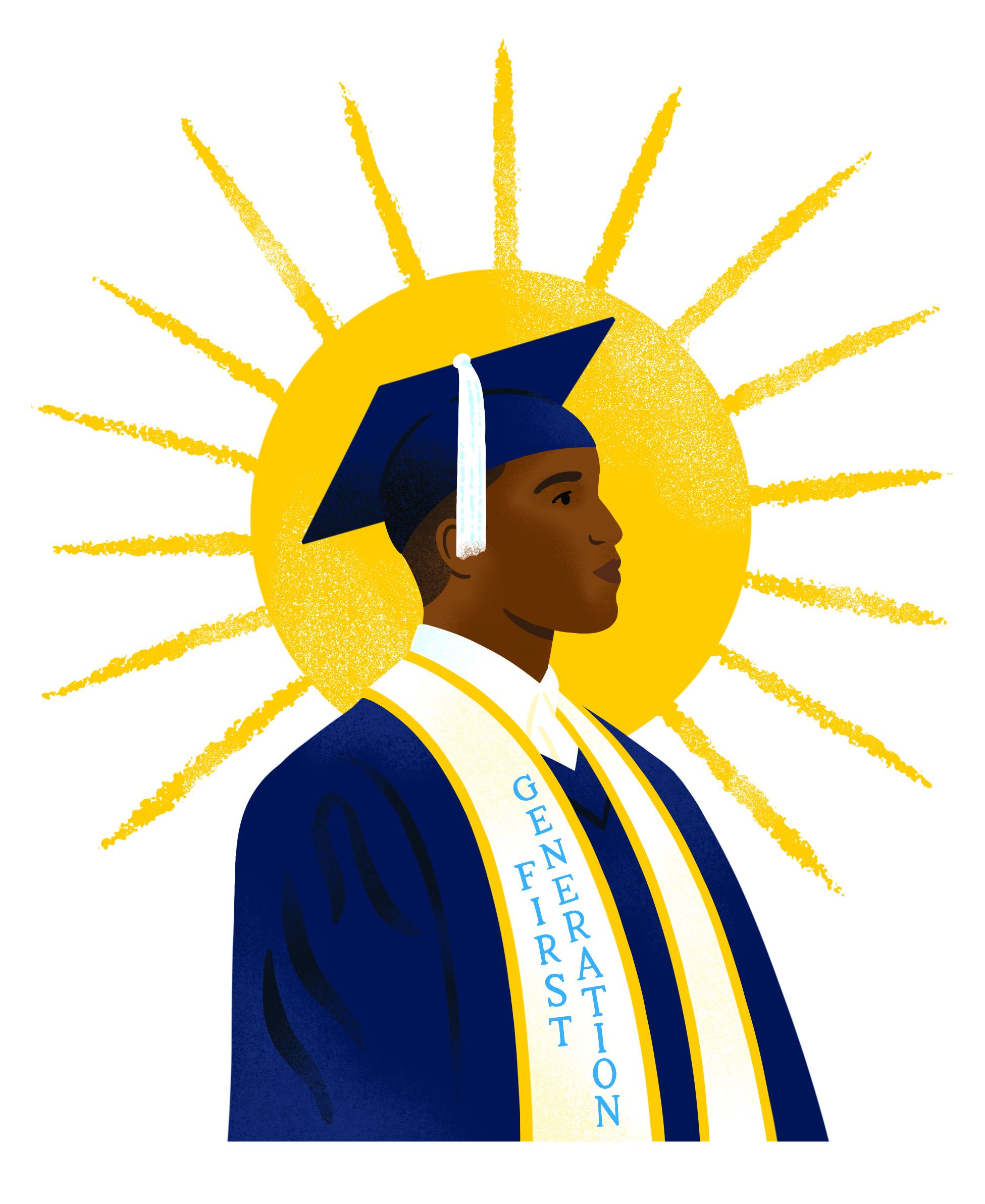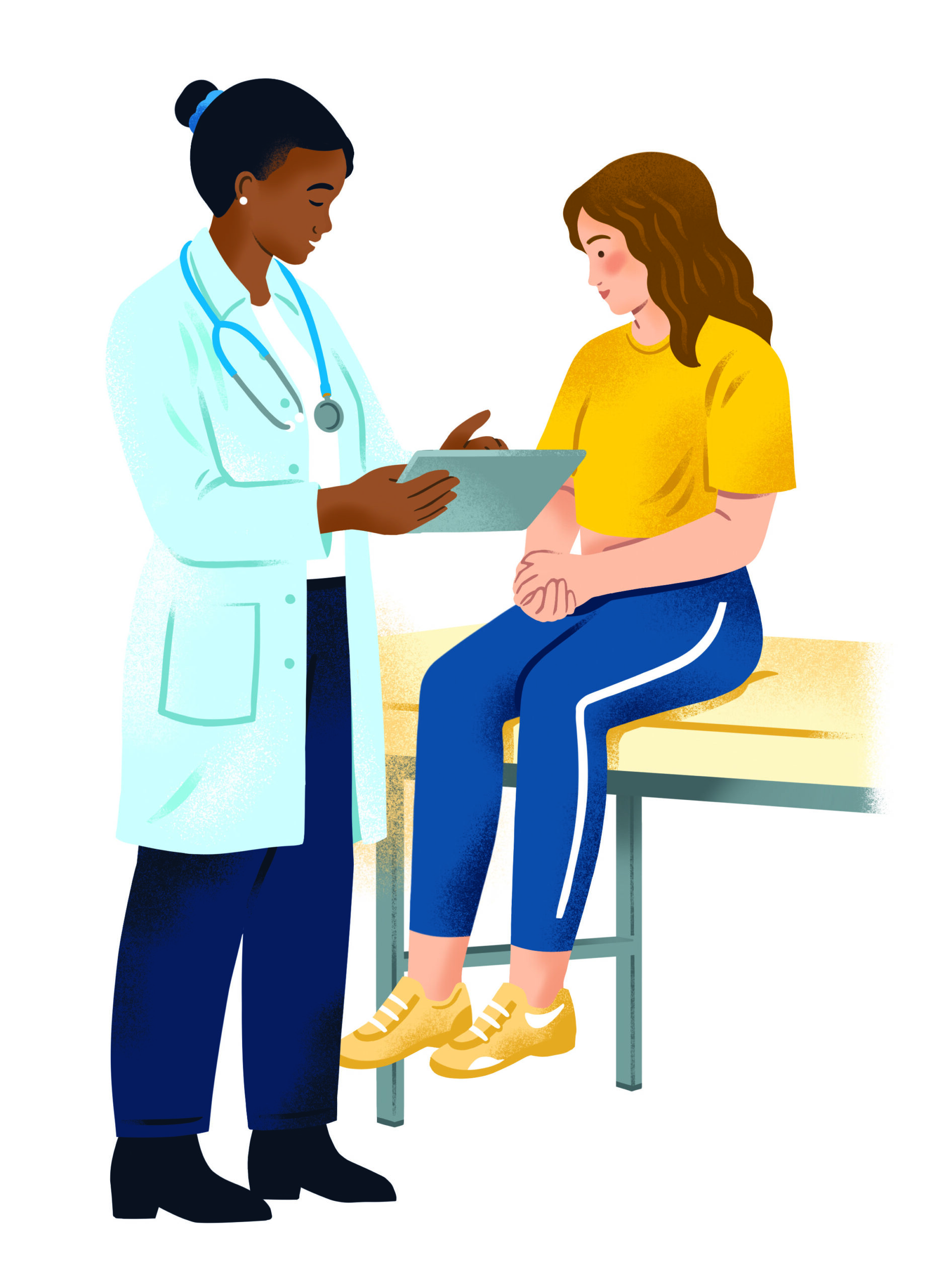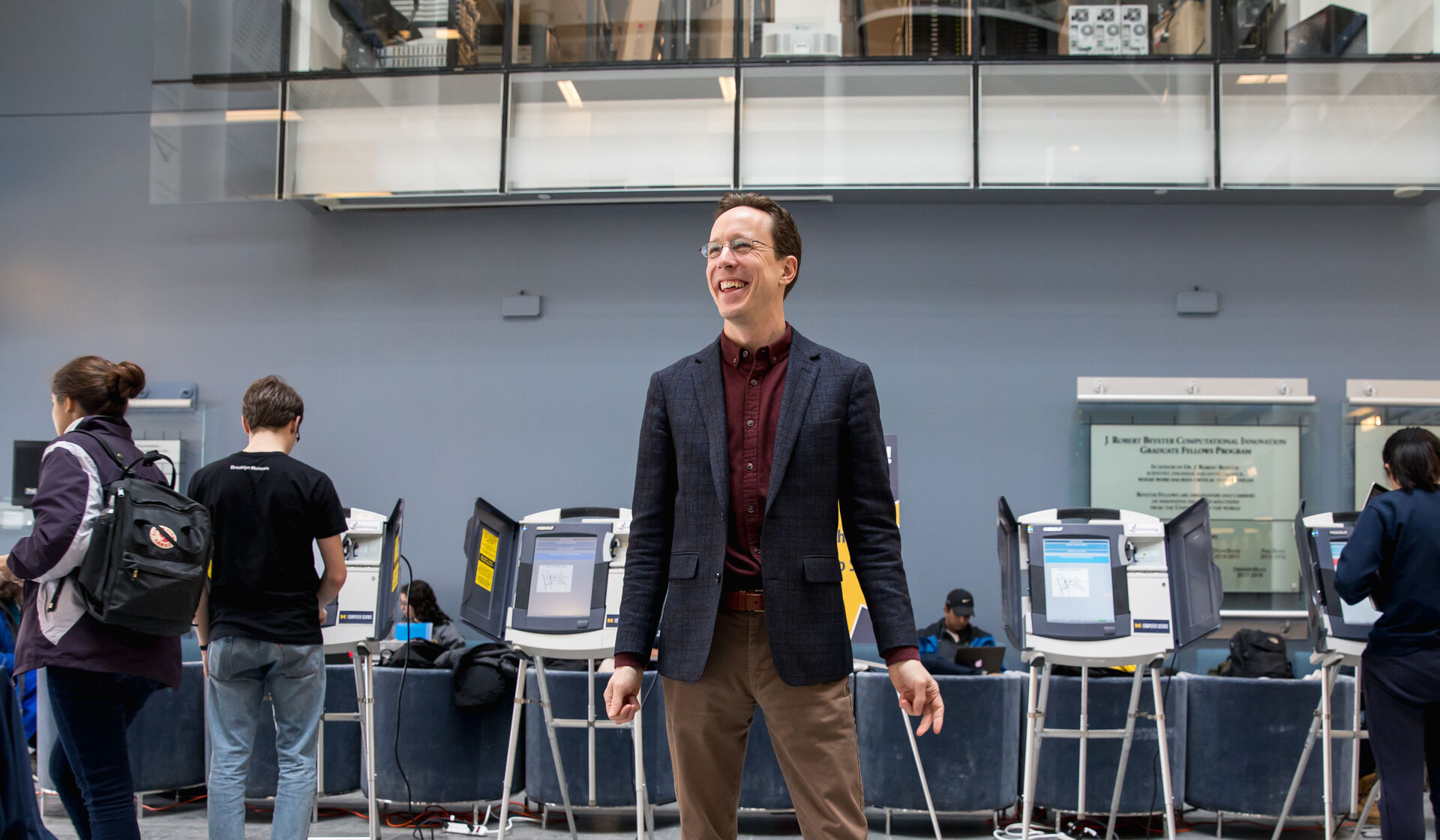U-M Sets Vision for the Next Decade
•
Illustrations by Lucy Davey
The University of Michigan laid out its strategic vision for the next decade with the aim to become “the defining public university.”
Vision 2034 was released in April after a year of gathering input from the campus community. Some 25,000 people participated and campus officials say alumni were the top group that engaged in the effort.
“Together, we have created a new vision that will open horizons and opportunities while drawing on our ethos, our tremendous strengths, and our exceptional capabilities as a university,” U-M President Santa Ono said in a video message announcing the vision.
Campus officials say the vision is not a strategic plan, but rather a guide to focus efforts during the next 10 years.
The vision outlines four key impact areas: life-changing education; human health and well-being; democracy, civic, and global engagement; and climate action, sustainability, and environmental justice.
“Over the next 10 years, we will harness our unparalleled excellence and vast intellectual resources to make dramatic, focused, and demonstrable advancements in service to humanity,” Ono wrote in the 43-page report outlining Vision 2034.
Ono said U-M will make strategic investments that will boldly affirm the critical role of higher education, and the University will continue to push the boundaries of knowledge, leading the way in scientific discovery.
“In the founding spirit of our University, it’s time for Wolverines everywhere to rise, to serve, and to further the greater good,” Ono wrote. “It’s time to do more with our strengths than we’ve ever imagined, to harness more than 200 years of unrivaled excellence, to venture beyond the conventions of our past, and to exceed our expectations for the future.”
To support the vision, the University will make strategic investments in seven commitment areas: purpose-driven education and student experience; research, scholarship, discovery, and artificial intelligence; community health support, prevention, and performance; arts and creative expression; diversity, equity, and inclusion; faculty and staff engagement and experience; and innovation, partnerships, and economic development.
The University will celebrate each of the four impact areas with a yearlong series of events. The 2024-25 academic year will be dedicated to democracy and civic engagement.
Democracy, Civic, and Global Engagement
The University has a long history as being a hub for political and civic engagement.
“That is something that has defined the University of Michigan for over 200 years,” Ono said on the podcast Michigan Minds, discussing Vision 2034. “It’s a place where people can argue, where students, faculty, and staff can actually challenge the status quo, where activism has been supported. But it has to be civil.”
Ono said the art and act of listening to people with different ideas and views is being lost.
According to the vision, the University is dedicated to equipping students with the necessary skills to make substantial contributions to society and ardently advocate for equal and active democratic participation.

The University also aims to empower individuals to become catalysts for positive change by engaging with local initiatives and global experiences.
“We are one of the largest and most research-intensive universities with an extraordinary number of thought leaders,” Ono said. “And with that comes the opportunity and responsibility to harness that to solve some of the issues that are confronting our civilization.”
As part of the vision, U-M wants to empower students to become active and informed contributors to democracy; enhance public conversation at U-M; ignite a passion for civic action in U-M students; strengthen partnerships and alliances at every level; and continue to cultivate a welcoming and inclusive atmosphere on campus.
Life-Changing Education
U-M views equal access to education as a key stepping stone to active citizenship, societal contribution, and personal fulfillment.
The vision states that U-M will work to expand access to education by addressing affordability and student success for individuals from all backgrounds, while also leading the way in transforming educational models.
Laurie McCauley, provost and executive vice president for academic affairs, said there will be a push for greater diversity in educational offerings.
“For instance, a commitment to online approaches, and non-degree classes and certifications so that we can spread our ability to educate people both near and far,” McCauley said on the Michigan Minds podcast.
U-M will continue to invest in programs such as the Go Blue Guarantee, which offers free tuition for admitted in-state students with family incomes below $75,000, and Wolverine Pathways, which offers free college preparatory enrichment and guidance to some middle and high school students in certain Michigan communities.

“All of this comes while we’re looking at ways to make education more affordable to all,” McCauley said.
She said the University knows it needs to expand its infrastructure so more students can be educated on campus. To that end, U-M is currently building more student housing.
As part of the vision, in the next decade, U-M plans to invest in innovative teaching methods, educational models and modalities, and experiential learning opportunities that meet the needs of today’s learners. It also aims to create a future in which a U-M education connects and empowers learners everywhere to reach their full potential by expanding access, offerings, and delivery to a more diverse community of individuals.
“Higher education is really a mechanism for strengthening our society as well as strengthening ourselves as individuals. We want to empower people to realize their goals and potential,” McCauley said.
Human Health and Well-Being
The University believes that health and well-being are fundamental human rights, and it aims to become a model of excellence for meeting the public health challenges facing society, as well as addressing the needs within the U-M campus communities.
One aspect of that is shifting a focus from disease management to illness prevention and wellness promotion.
“I really truly believe the answer to the exploding cost of health care is not more high technology … it’s helping people become more healthy,” said Marschall Runge, executive vice president for medical affairs at U-M on the Michigan Minds podcast. “There’s no question that preventing illness not only prevents the illness, it helps people mentally and emotionally. That has not been a major goal for health care providers, but it is a major goal, and it’s one of our major goals.”

In the next decade, the University aims to promote a vibrant and health-conscious campus culture and become the leaders and best of health care delivery innovation.
Runge said some of those efforts are already underway, which includes using drone technology to deliver specialized drugs to patient homes and finding other home-based care.
“We’re already doing a lot of virtual care and telehealth, but we’re now looking toward technology, including artificial intelligence and machine learning, to help us expand hospital care at home, also to reduce the burden on our health care providers,” Runge said.
Another major aim is closing the health equity gap by directing research and clinical breakthroughs toward the needs of the underserved.
“If we put our minds to it, and we leverage the collaborative nature of the University of Michigan with [its] broad, broad excellence, I think we can make contributions that none of us could imagine, and I’m really excited about seeing that happen,” Runge said.
Climate Action, Sustainability, and Environmental Justice
U-M says it is uniquely positioned to lead the effort of mitigating and adapting to climate change through groundbreaking research, revolutionary education, campus operations, and creative programming designed to increase resilience and minimize avoidable impacts.
As part of the vision, U-M is committed to becoming carbon neutral by 2040 through energy efficiency, electricity from renewables, and fossil-free heating and cooling strategies.
Geoff Chatas, the University’s chief financial officer, said on the Michigan Minds podcast that includes geothermal installations to help heat and cool buildings efficiently.
“We’re also working on a 200-megawatt solar farm that’s going to be built outside of Ann Arbor [that will] bring direct power to us,” he said. “So these are important steps as we go forward to make sure that we’re going to meet this goal.”
The University is also planning to decarbonize its entire fleet of vehicles and is looking at how to develop an automated transit system that uses electric propulsion and operates without a driver. The aim, Chatas said, is to use our campus as a living lab that could serve as a model for the rest of the world.

“We have the potential to discover new technologies and generate sustainable solutions in a range of critical areas, which include energy, transportation, supply chain, and food and water insecurity,” Chatas said.
As part of the vision, U-M plans to deepen its commitment to environmental justice and nurture future leaders in sustainability.
“I think Michigan is really positioned to make a major difference,” Chatas said. “I would say that there’s some work to do today and a lot to do tomorrow, but I think this Vision 2034 process, coupled with our campus planning, is really giving us a great blueprint to focus on sustainability and everything we do to make sure that every member of our community is involved in this.”
Jeremy Carroll is the content strategist for the Alumni Association of the University of Michigan.



